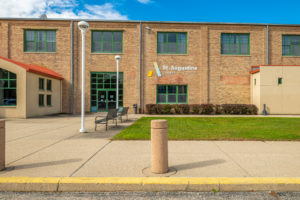Lewis University and St. Augustine College Complete First Step of Merger

12/1/23
With approval of the Illinois Board of Higher Education, and the Higher Learning Commission, St. Augustine College has now joined Lewis University as of December 1, 2023.
This exciting step forward brings together two historically significant institutions and maximizes their ability to advance educational opportunities connected to the most in-demand careers of the future.
From its humble beginnings in 1932, when 15 students enrolled in an aviation-focused curriculum, to now becoming the eighth largest, private, not-for-profit university, in Illinois, Lewis University has been a leader in integrating liberal arts with professional preparation. St. Augustine College, established in 1980, was the first bilingual institution in the Midwest creating a welcoming environment for Hispanic students in Chicago to enroll and achieve in college. Today, St. Augustine serves both Hispanic and other under-represented groups, graduating students in high-demand majors, such as Respiratory Therapy and Early Childhood Education.
“This affiliation was possible because two institutions, fully aligned in their mission of serving students, are becoming stronger together”, Dr. David Livingston, president of Lewis University, said.
“St. Augustine College always has reached out to students often overlooked by traditional higher education. The expanded opportunities our affiliation with Lewis University present will be transformational to entire families in the Chicago area”, Dr. Reyes Gonzalez, president of St. Augustine College, said.
The final step of the process will occur following formal approval by the U.S. Department of Education. Until that final step occurs, Lewis and St Augustine will actively partner while maintaining their separate and independent accreditations and degree-granting authority.
“In a future that will require increased levels of training and education for success, we can serve as a model for all of higher education that through collaboration, rather than competition, students will be the ultimate beneficiaries”, Dr. Livingston, concluded.
Why are Lewis University and St. Augustine College merging?
Our two institutions each come from a noble history of providing education as a life-changing pathway to expanded opportunity. Our missions are closely aligned.
We are each strong and thriving because we serve students from all walks of life. This is a unique opportunity for our institutions to do even more of what we each do so well, providing affordable degree programs with a liberal arts core and an emphasis on career and workforce preparation.
We are excited for this new chapter. Together, we will realize the dreams held by our founders; dreams of providing education to all, regardless of social class. Together, we will welcome even more bilingual students, adult learners, and other non-traditional students – students who have not been well-served by traditional higher ed.
Our combined future is an educational community where all students belong and are celebrated for their unique potential. No student today should face limited educational opportunities because of language. Especially not when the Hispanic community is the fastest-growing population in Chicago.
How will this merger benefit each institution?
We will build upon the legacy and tradition of St. Augustine College, offering an expanded range of bilingual education programs, services, and outreach to the Hispanic population, which is the fastest-growing group in Chicago.
Lewis University will benefit from St. Augustine’s unique bilingual environment and understanding of how to best support bilingual learners for success. As a Hispanic-serving institution since its founding, St. Augustine College has created an educational community and supporting systems – including multicultural educators and a learning facilitator for each student from enrollment through graduation – that will be a model for our combined success.
St. Augustine students will gain access to an expanded number of program options in the bilingual format built upon the expertise of Lewis University’s history in Aviation, Health Sciences, and Technology, and supported by Lewis University’s well-established administration systems.
How soon will the merger be completed?
With the completion of step one of the merger as of December 1, 2023, we are now aligned as a single corporate and legal entity. The final step will occur following formal approval by the U.S. Department of Education. Until that time, Lewis and St. Augustine will actively collaborate while maintaining their separate and independent accreditations and degree-granting authority.
When will the two institutions officially merge under the Lewis University name?
The official change in name will take place when the formal approval by the U.S. Department of Education occurs. The process of transitioning signage and other physical aspects of changing to St. Augustine College at Lewis University will be implemented over time.
Will the newly unified institution be Lasallian?
With our unified future, St. Augustine aligns with the Lasallian global network, one of the largest Catholic education networks in the world and one of the largest Catholic higher education networks in the United States.
Both our institutions were established to meet the needs of our times.
Lewis University, founded during the Depression Era with an emphasis on aviation programs, evolved to meet the needs of young men seeking a practical vocation with social mobility. The expansion of opportunity we will achieve through this merger is fundamental to our Lasallian heritage. As we combine our institutions, we are walking in the footsteps of Saint John Baptist de La Salle, who transformed education by opening schools to students regardless of their social class, profoundly impacting the underserved.
St. Augustine College, founded in 1980, was the first bilingual higher education institution in the Midwest. The heart of our mission is to provide transformative education in a supportive, bilingual environment. We will sustain that mission and expand its reach through this united future.
The strength of these combined legacies is the foundation for our future success.
What new degree programs are planned?
In addition to the academic programs currently offered through St. Augustine College, Lewis University expects to add expertise in Aviation, Health Sciences and Technology for a significantly expanded range of options in the bilingual format. Not only will we be able to serve more students from all walks of life, including more bilingual and adult learners, we will be able to offer many more program options to better meet the needs of the future.
Above all, our expanded program options will align with the skills and credentials employers seek. Our students need to be prepared for success in the marketplace. That is the core principle that will guide our investments and program enhancements.
How will this merger benefit the Chicagoland region?
We will build upon the legacy and tradition of St. Augustine College, offering an expanded range of bilingual education programs, services and outreach to the Hispanic and other underserved populations.
In Chicago, the Hispanic community is the fastest growing population. For our region to thrive, we must support the success of the Hispanic community. The jobs of the future will require an educated workforce to support the economy. And yet only about 30 percent of Hispanic adults in Illinois have a college credential. By equipping our students for success in today’s marketplace, we can be an important instrument in building an equitable, economically thriving Chicagoland.
Our Mission is bigger than just a degree or a job. We see our educational community as the foundation for the expansion of human potential. That growth through education is what supports the workforce and economic development our region needs.
We will complete all necessary submissions and filings as required by the U.S. Department of Education by the January 31, 2024 deadline. In the meantime, work on implementation and integration will be ongoing until we receive final approval to become a fully merged single institution.




